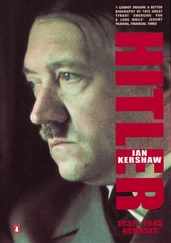Two further speeches by Himmler to officers in the next few days had much the same tenor: the recourse to the baleful precedent of 1918, the fulfilment of duty this time by the people and almost all the army but the shame ‘a colonel’ had brought on the officers corps, the lack of loyalty of some officers, and the need for ruthless action against those guilty of cowardice. The emphasis was once more on the war aims that could not be given up—including, now, mastery over the Continent to afford protection in future wars through the extension of defence frontiers. 59The unbounded ruthlessness that was more than ever to become the Reichsführer-SS’s trademark in subsequent months was evident in his message to his liaison officer in Hitler’s headquarters, Hermann Fegelein, that at the sign of any disintegration among divisions serving in the east (which he put down to sedition spread by Communist infiltration) ‘reception detachments’ ( Auffangkommandos ) of ‘the most brutal commanders’ were to shoot ‘anyone opening his mouth’. 60
Himmler’s authority to intervene in what had hitherto been army matters was widened still further by another Führer decree on 2 August, giving the Reichsführer-SS powers, through radical restructuring, to inspect and ‘simplify’ (meaning reduce in size, producing savings in manpower) ‘the entire organizational and administrative basis of the army, the Waffen-SS, the police and the Organisation Todt ’ to produce more manpower for the army. 61The last of these bodies, the OT, was the huge construction complex, whose massive workforce Speer had now agreed to expose to the Reichsführer-SS’s new powers for labour saving. 62Cuts in what he saw as a bloated army administration had been part of Himmler’s intention from the start, and he was able through his excisions to raise another 500,000 troops for the front and create fifteen Volksgrenadier (People’s Grenadiers) divisions from new recruits. 63With this new authority, Himmler was now a party to the power-struggle at the top of the regime for control of the new total-war drive.
Goebbels was a second key winner from the events of 20 July. The crucial role that he had played in crushing the uprising in Berlin was acknowledged by Hitler. Under the impact of the attack on his life, and the shock to the system that this represented, Hitler was now at last prepared to grant to his Propaganda Minister the position that Goebbels had been seeking for well over a year, and finally make him Reich Plenipotientiary for the Total War Effort.
The meeting of ministers or their representatives chaired by Lammers that took place on 22 July, a day later than had originally been arranged, amounted practically to a ritual acclamation of Goebbels as the new total-war supremo. 64At the very outset of the meeting, Lammers—safe in the knowledge that the Reich Chancellery, over which he presided, had been exempted by Hitler from any inroads into its personnel—proposed the Propaganda Minister for the task of mobilizing the civilian sector. Keitel, Bormann and all others present supported the proposition. Goebbels spoke for an hour, portraying the issue as threefold: providing new manpower through cutting back on Wehrmacht administration, drastically reducing the state bureaucracy, and a vaguely couched ‘reform of public life’. The Party, Goebbels acknowledged, did not fall within his purview. That was Bormann’s domain, for him alone to handle. Combing out the military sector was also ruled out of the proposed operations. This was set aside for the new Commander-in-Chief of the Replacement Army, Heinrich Himmler.
Speer, who had tried hard in mid-July to press for total war, found himself now largely on the sidelines. His memorandum of 12 July, received, on Hitler’s instructions, only little attention to prevent the meeting becoming immersed in detail. When Speer spoke, in fact, the figures he gave for potential savings from state bureaucracy were immediately contradicted by Lammers and the State Secretary in the Reich Ministry of the Interior, Wilhelm Stuckart. Vested interests came into play straight away as Stuckart emphasized how little spare capacity for manpower savings existed in the state bureaucracy. Goebbels steered the meeting away from a likely descent into detail and back to the general issue. For the Propaganda Minister, as he plainly stated, total war was ‘not only a material, but especially a psychological problem’, and he acknowledged that some of the measures taken would ‘in part have merely optical character’. Ideological mobilization was, as ever, his chief concern. The meeting ended, predictably, with Lammers agreeing to propose Goebbels for the position as Plenipotentiary next day, when most of those present would gather again to report to Hitler at his East Prussian headquarters. 65
Goebbels was happy. ‘All those taking part’, he jotted in his diary,
are of the opinion that the Führer must provide the most extensive plenipotentiary powers, on the one hand for the Wehrmacht, on the other for the state and public life. Himmler is proposed for the Wehrmacht, I, myself, for the state and public life. Bormann is to get corresponding full powers to engage the Party in this great totalizing process, and Speer has already received the powers to intensify the armaments process. 66
When the meeting reassembled in Hitler’s presence the following afternoon, Göring and Himmler were also in attendance. Göring protested in vain at yet a further diminution of his power in handing Himmler responsibility for matters which should properly, he claimed, be those of the commanders-in-chief of the Wehrmacht. Hitler intervened to back Himmler. The resulting experience could then be utilized by Göring and Grand-Admiral Karl Dönitz, who, as Commanders-in-Chief of the Luftwaffe and Navy, continued to be responsible for their own domains. The compromise was accepted. For the rest, Hitler, who had evidently carefully read Goebbels’ memorandum of 18 July, backed the Propaganda Minister and the proposal for drastic new measures in the total-war effort. ‘The Führer declares that there is no further use in debating specific points,’ Goebbels recorded. ‘Something fundamental has to be done or we can’t win this war.’ Hitler’s position, he noted, was ‘very radical and incisive’. In what would become a cliché in the last months, Hitler spoke of the new radicalization as a return to the Party’s roots. Characteristically, too, he played on the populist assumption ‘that the people wanted a total war in the most comprehensive fashion and that we cannot contradict the will of the people in the long run’. Goebbels was delighted at the outcome, and at Hitler’s changed approach. ‘It is interesting to observe’, he commented, ‘how the Führer has changed since my last talk with him on the Obersalzberg [on 21 June]. Events, especially on the day of the assassination attempt and those on the eastern front, have brought him to the clarity of the decisions.’ 67
Two days later, on 25 July, Hitler signed the decree making Goebbels Plenipotentiary for Total War. 68Goebbels was elated over his triumph—a far greater success, he claimed, than he had imagined. His press secretary, Wilfred von Oven, thought he was now ‘the first man in the Third Reich after Hitler’. 69Three times in his diary the Propaganda Minister himself spoke of ‘an internal war dictatorship’, implying that this, his coveted goal, would now be in his hands. 70It was a fine conceit, but Goebbels was aware that he would remain, if with strengthened authority, only one, not the sole, source of power beneath Hitler and that, as ever, this power would be wielded in competition, not unison. The very wording of the decree, as he recognized, limited the scope of his powers. He could issue directives to the ‘highest Reich authorities’, but any decrees of implementation that arose had to be negotiated with Lammers, Bormann and Himmler (in his capacity as General Plenipotentiary for Reich Administration, which had fallen to him when he became Minister of the Interior). He was dependent upon Bormann’s support for measures involving the Party. And in the case of unresolvable conflict arising from his orders, Hitler reserved his own authority to make any necessary decision. Some exemptions were made on Hitler’s express authority. The personnel of the Reich, Presidial and Party chancelleries, the Führer’s motor vehicle staff, and those involved in planning the rebuilding of Berlin, Munich and Linz were excluded. 71And a major area, the army, had, of course, from the beginning been carved off and given over to Himmler.
Читать дальше












